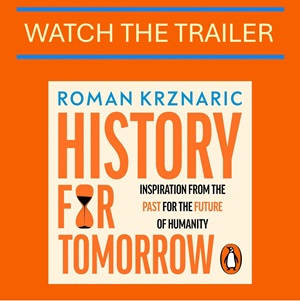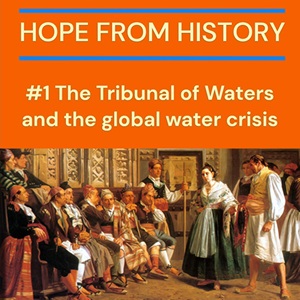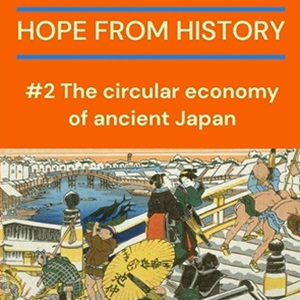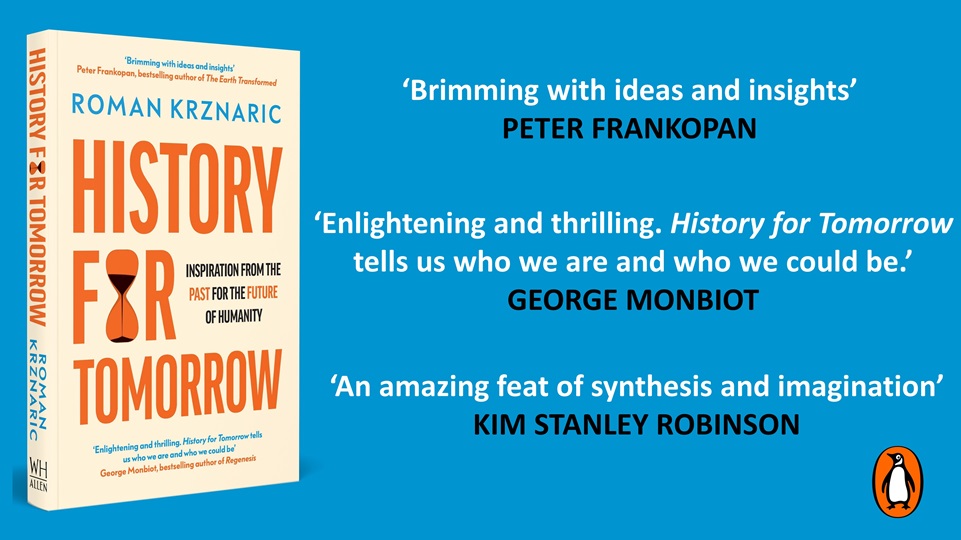
History for Tomorrow: Inspiration from the Past for the Future of Humanity is published by Ebury (Penguin Random House). Order the hardback, ebook or audio book (narrated by the author!). Paperback coming July 17!
Out now in Dutch, Portuguese (Brazil), Norwegian and Portuguese (Portugal). Coming soon in German, Korean, Spanish, Thai, Italian, Croatian, Japanese, and other languages.
Videos
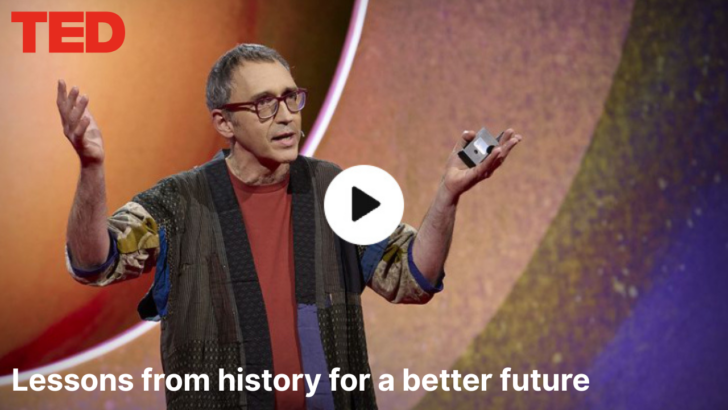
About the book
As humanity faces a future of uncertainty, we would be wise to look backwards as we seek to chart a way forwards.
What can the history of slave revolts teach us about the power of rebellion to tackle the climate crisis? How might understanding the origins of capitalism spark ideas for bringing AI under control? What could we learn from eighteenth century Japan for creating regenerative economies today, or from the coffee houses of Georgian London for taming social media?
Leading social philosopher Roman Krznaric unearths fascinating insights and inspiration from the last 1000 years of world history that could help us confront the most urgent challenges of the twenty-first century. From bridging the inequality gap and reducing the risks of genetic engineering, to reviving our faith in democracy and avoiding ecological collapse, History for Tomorrow shows that history is not simply a means of understanding the past but a way of reimagining our relationship with the future. Krznaric reveals how, time and again, societies have risen up, often against the odds, to tackle challenges and overcome crises. History offers a vision of radical hope that could turn out to be our most vital tool for surviving and thriving in the turbulent decades ahead.
Selected Reviews
“Enlightening and thrilling. History for Tomorrow tells us who we are and who we could be.”
George Monbiot“‘Brimming with ideas and insights, this is a welcome, important and clear-eyed view of how understanding the past can help us better prepare for the future.”
Peter Frankopan, author of The Silk Roads and The Earth Transformed“A fascinating account of historical moments that could serve as beacons of hope for our own times.”
Amitav Ghosh, author of The Nutmeg’s Curse“We need lessons from history now more than ever. History for Tomorrow could not be timelier or more welcome. Krznaric is fighting the good fight.”
The Guardian (Guardian Weekly Book of the Week)“An amazing feat of synthesis and imagination, weaving together many different strands of world history to make a pattern that can guide us in the present toward a vibrant future. Krznaric’s book is immensely suggestive of positive actions that have track records; they’ve worked before, and in new formulations they can work again. Wise and practical inspiration.”
Kim Stanley Robinson, author of The Ministry for the Future“The disastrous mess we find ourselves is, in part, maintained by a spell that has been cast over us. This spell creates impotency and despair by telling us that there is no other way to be here together on our home planet, that our very nature is bad and destructive, that we are bound to fail. Roman Krznaric comes with the sorcerer’s ability to break spells and open our minds and souls to visions of alternatives; not as pies in the sky but as lived realities of our kin around the world who we find ourselves separated from and from our own past that we have somehow been made to forget. His book helps us to see with new eyes and to believe in ourselves as a species. These are foundational needs if we are to meet our predicament with a deep belief that change really is possible.”
Gail Bradbrook, Co-Founder, Extinction Rebellion“Krznaric is an intellectual syncretist whose bestselling books have been all directed towards creating change through ideas. History for Tomorrow isn’t a book that pushes a grand theory of history or even human nature. Neither does it have all the answers. But what sets it apart is that it knows where to look. A wonderful grab-bag of inspiring ideas and stories. “
Byline Times“Essential thinking about the big issues facing the world today.”
Brian Eno“Roman Krznaric turns to the past not for its own sake, but for ours. In his deft hands, case studies suggest how we can do better – learn and be capable – as we face the largest challenges of the present.”
Dr Sarah Knott, Sally Reahard Professor of History, Indiana University and author of Mother: An Unconventional History“History for Tomorrow simply fizzes with ideas: it reads like a series of dazzling talks, or better, conversations over the kitchen table, drawing inspiration – and warnings – from history at this critical moment in the human story. Roman Krznaric is thinker, synthesiser, agent provocateur, joueur d’esprit, teasing out links between, say, Georgian coffee houses and today’s social media, the Jamaican Slavery wars and Extinction Rebellion, or World War Two rationing and sustainable economics in Tokugawa Japan. It is a paean to the ideals of humane civilisation and at the same time a calm but urgent rebuke to our culture of limitless desire. Compassionate, insightful and hopeful, these are above all great stories, with the widest range in time and place, revealing with startling clarity what human beings have done, and can do, when they organise, cooperate and help each other. As our world burns, as the rich devour the earth, and as our wealth is still spent on war, it is time to remind ourselves that it doesn’t have to be like that. History for Tomorrow will make you think about history in a different way.”
Michael Wood, historian, broadcaster and Professor of Public History, University of Manchester“Roman Krznaric has achieved a tour de force with a book that draws unexpected links between historical events from all over the world. This is a uniquely hopeful book, which never romanticizes the past but inspires us to imagine alternative solutions to address the most urgent issues of our time.”
Dr Hélène Neveu Kringelbach, Associate Professor of African Anthropology, University College London
“History for Tomorrow’s sheer erudition is impressive. What will make this book live on is its radical rejection of our separateness, our alienation from nature and each other, and the historically justified case that alternative worlds are possible as they have been in the past.”
Sydney Morning Herald
“Fascinating and thought-provoking. History for Tomorrow is a superb example of the capacity of the humanities and social sciences to reflect on the lessons of the past, without being despairing or simplistic. His expansive grasp of human history enables him to stud his book with engrossing examples. The breadth of his research is startling.”
Professor Peter McPhee, The Conversation
“Roman Krznaric has a way with history. He outlines the familiar, while constantly inserting quirky extras that augment his argument. His writing comes alive on so many levels, from curiosity to object lesson.”
Miriam Cosic, The Monthly
“The book is rich and full of striking examples and is suitable for anyone who wants to believe that positive change is possible. It’s a book that makes me as a reader think, and I wonder if I haven’t been living in a kind of cognitive blindness before I read it.”
Ny Tid (Norway)
“A marvellous listen that could spark revolutions!”
Mostly Books (audio review)
“Roman Krznaric challenges habitual thinking and unites vast amounts of knowledge with a unique knack for impactful reasoning and vivid storytelling.”
Klassekampen (Norway)
“A provocate book that shows we can indeed learn from history. Accessible and stimulating.”
Trouw (Netherlands)
“Krznaric writes compellingly and convincingly. The examples are well chosen and make the reader think about alternatives. With History for Tomorrow he effectively counterbalances doomsday scenarios and pessimism.”
Volkskrant (Netherlands)
“For the past week I have been so engrossed in this book that my boyfriend has pointed out that I seem completely in love. He is right. I am captivated by the author and philosopher, Roman Krznaric. And there are several good reasons for that. Not since I studied the history of ideas in my twenties and practically ate, slept and showered with the books I got lost in, have I experienced such a strong effect from a non-fiction book. I would give a lot to be a (young) student again, travel to Oxford and attend lectures with Krznaric once a week. Because this is a person who wants something revolutionary and who inspires action. Perhaps it is the loving, but also impatient anarchism of Krznaric, and the ability to stretch a thought far, which makes me so alert and excited reading his book.”
Hanne Ramsdal, New Times (Norway)
“Well written, easily accessible, hopeful and often inspiring. By turning to history, Krznaric shows that other futures are possible, that we can live in fundamentally different ways, and that a stagnant economic and political system is not a given. “
Framtida (Norway)
“Most likely the non-fiction book of 2024! Completely in the style of Blom and Harari, ideal fodder for better history education and social discussions. Read and talk about it together!”
Historian Pieter Serrien, Goodreads
Selected Articles, Talks and Interviews
TED talk: Lessons from History for a Better Future
Guardian: How will we solve the world’s water wars? An ancient Spanish court offers one answer
BBC Culture: What the Japanese Edo period can teach us about today
NPR All Things Considered: Interview on how history teaches that disruptive movements work
Aeon Magazine: Essay on the Disruption Nexus, a model for rapid, transformative change
The Scotsman: Could a medieval Islamic kingdom offer clues for creating cultures of tolerance today?
Open Democracy: Fake News was Invented 500 Years Ago – We Must Learn from its History
Long Now Foundation: What Doughnut Economics Can Learn from History (joint lecture with economist Kate Raworth)
Big Issue: Are we suffering from ‘democratic fatigue syndrome’?
Byline Times: Author and book profile
Royal Society of the Arts: 35 min public lecture on History for Tomorrow
The Great Simplification: In conversation with systems thinker Nate Hagens on his pioneering podcast
Five Books: A personal selection of the five best books on lessons from history
Other Media
New Statesman Q&A, BBC World Service, Life Matters (Radio National Australia), Intelligence Squared podcast, Hindustan Times, How To Academy, Future Tense (ABC Radio National Australia), DLD tech conference (Munich), NRC (Netherlands), Afternoons (Radio New Zealand), Usbek & Rica (France), The Philosopher Magazine, De Morgen (Belgium), Filosofie Magazine (Netherlands), The New Abnormal podcast, Everyday Anarchism podcast, Morgenbladet (Norway), Agenda Magazine (Norway), Dagsavisen (Norway), Harvest Magazine (Norway), Future Learning Design podcast, Historiek Magazine (Netherlands), Blomcast, De Standaard (Belgium), Wisdom & Action podcast, Radboud Reflects (Netherlands), Trouw (Netherlands), Valor Economico (Brazil), Nathalie Nahai podcast, Tertio (Belgium), Agenda Magazine (Norway), Idees podcast (Norway), Weekend University podcast, Kakanomics (Norway), History Shorts podcast, De Correspondent podcast (Netherlands), Politiken (Denmark), Groenlinks thinktank (Netherlands), Black Mountains College, Folha Sao Paulo, Climate Curious podcast
